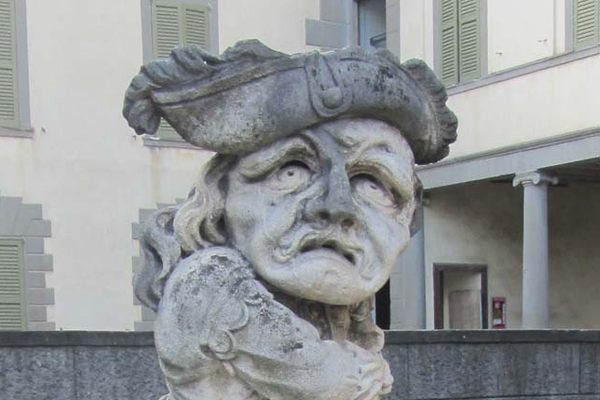Caravaggio Sanctuary Guillotine
An underground passage is home to a guillotine that predates the French Revolution by more than two centuries.
In the village of Caravaggio is a sanctuary dedicated to the worship of Santa Maria del Fonte (Saint Mary of the Spring), who, according to Catholic tradition, appeared to a shepherdess on May 26, 1432, at this very location. The sanctuary consists of a monumental church, surrounded by landscaped gardens and four symmetrical porticoes.
Underneath this huge structure is a corridor running the whole width of the church. The corridor is divided into five sections, or cells. Approaching the sanctuary from its southwest side, the first cell houses the fountain connected to the so-called Sacred Source, a spring whose water is considered blessed. Moving forward, the second cell does not have any discerning characteristics, and it simply connects the first to the third cell, which contains two mosaics. The fourth section is also a connecting cell, and the final section on the northeast side of the sanctuary contains an upside-down niche housing a rudimentary guillotine.
Legend has it that in 1520 a bandit was captured and condemned to capital punishment. Upon approaching his final hour, this man repented and asked Mary for forgiveness. As a result of this, the guillotine “refused” to behead him. This is one of several alleged miracles linked to the Santa Maria del Fonte, and since that day, this instrument of death has been held at the sanctuary as a holy relic.
The guillotine, as we know it today, stems from the French Revolution. Compared to its French counterpart, this guillotine is small and rudimentary, but it is no doubt a tool meant for beheading. A blade is attached under a heavy log, which was held hovering above the head of the condemned by means of two metal rings. Once the log was released, the weight of the log would make the blade slide along rails, and the full blow would decapitate the convicted.
On the left of the guillotine, an inscription reads, “Over the head of the repenting bandit, waiting for death due to human justice.” On the right, another inscription says, “The maternal benevolence of the Virgin arrests the deadly axe - 26th May 1520.”
Plan Your Trip
The Atlas Obscura Podcast is Back!

























Follow us on Twitter to get the latest on the world's hidden wonders.
Like us on Facebook to get the latest on the world's hidden wonders.
Follow us on Twitter Like us on Facebook